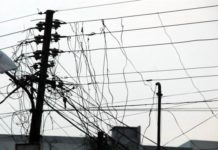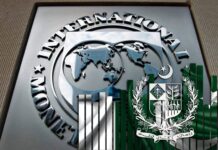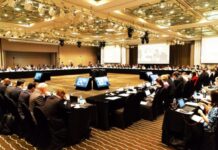
ISLAMABAD: The top leadership is in a conundrum over whether to approach the International Monetary Fund (IMF) for another bailout package as the macroeconomic situation worsens.
On Tuesday, an IMF technical assistance team concluded its week-long visit to Pakistan, which was also corroborated by its Resident Representative in Islamabad Daban Sanchez, reported Express Tribune.
The IMF technical assistance team comprised of Richard Llaudes, including Sanchez, Jongsoon Shin, Hua Chi, Tasneem Aslam and Maxym Kryshko, revealed sources.
As per sources, the main aim of the IMF technical team’s visit to Pakistan was to assess the macroeconomic state of the country and came upon the request of the Ministry of Finance.
On Friday, the National Security Committee (NSC) was provided a presentation regarding the worsening macroeconomic condition by the finance ministry.
It was the 26th NSC meeting being held which was presided over by caretaker Prime Minister (retd) Nasir-ul-Mulk in which details of the Action Plan were deliberated upon.
The NSC acknowledged the endeavours of the finance minister and her team at the FATF and it discussed the overall economic position of Pakistan.
An exhaustive presentation to the NSC meeting participants was provided by interim finance minister Dr Shamshad Akhtar regarding the cogitations during meetings of FATF and International Co-operation Review Group held in Paris.
According to sources, the NSC expressed dissatisfaction over the manner the economy was being managed by the government.
The NSC expressed worry over the high level of public debt, the influence and logic of the recent rupee devaluation and high external financing requirements for FY19, said sources.
Previously, the caretaker government had stopped the finance ministry from reaching out to the IMF at any level.
However, sources said the finance ministry was in favour of formally reaching out to the IMF due to deteriorating external sector position.
Nonetheless, Pakistan’s top leadership have certain hesitancy at this juncture and sources revealed their major worry is over the consequence of the next IMF programme on China-Pakistan Economic Corridor (CPEC).
The committee directed the finance ministry to apply its earlier decisions on the economy, said sources
The NSC was apprised the country’s public debt to GDP ratio would surpass 72 percent or around Rs25 trillion for FY18.
Also, the sources disclosed there were worries over refinancing public debt, especially external public debt.
And the committee was provided details regarding the widening fiscal and current account deficit, said sources. They shared the final figures weren’t available, but it is expected current account deficit for FY18 could be over $18 billion.
Also, sources revealed the country’s external financing requirement would range from $25 to $27 billion for FY19 and they couldn’t be met alone with the assistance of China.
However, sources in the finance ministry stated rising external financing requirements would force Pakistan to get the World Bank, Asian Development Bank’s and IMF’s assistance.
The sources in the finance ministry said the IMF team was provided with provisional macroeconomic indicators but the delegation did not share its macroeconomic details with Pakistani authorities.
On Thursday, Financial Times reported Pakistan has reached out to China asking for more loans to avoid a foreign currency crisis.
Pakistan cautioned China if the loans dry up Beijing’s $60 billion investment in China-Pakistan Economic Corridor could be under threat, said FT.
In the first ten months of FY18, China lent Pakistan $1.5 billion in bilateral loans and it also received $2.9 billion in commercial bank loans mostly from Chinese banks.
Pakistani officials have told their Chinese counterparts in case the country seeks a bailout from the IMF, details of CPEC and how it is being funded will have to be shared with them and force it to cancel some of the infrastructure projects already planned.
In a statement to FT, one government official said We had a detailed discussion with the Chinese and we shared our concern. The main issue is that once we are locked in an IMF programme, we will have to make full disclosure of the terms on which China has agreed to build the CPEC.”






















